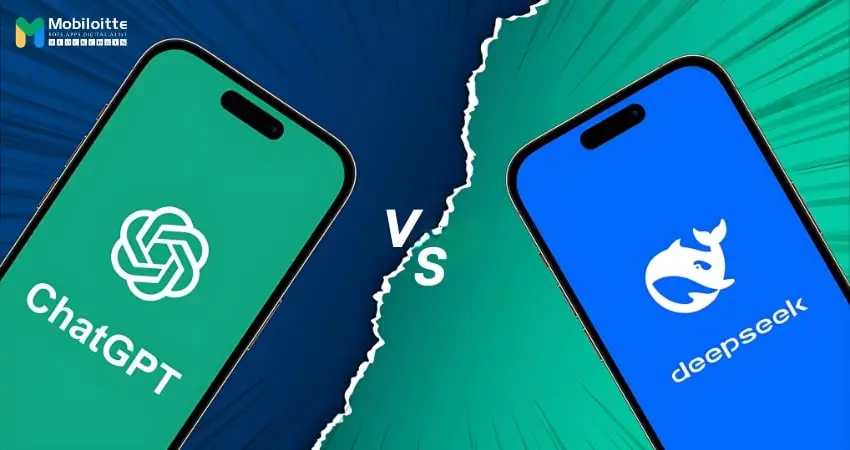Artificial intelligence has been reshaping our world in remarkable ways. Among the most influential of these innovations are conversational agents and search engines powered by AI. In today’s showdown, we deeply dive into two major players in this space: ChatGPT and DeepSeek and their AI Solutions. Both systems represent the forefront of AI-driven interactions, yet they cater to different needs and promise unique benefits. This article examines their strengths, weaknesses, and inclusive approaches while comparing them across several key dimensions.
Origins and Evolution
Similarly, ChatGPT is the result of OpenAI’s extensive research in natural language processing. As a result, it is designed to understand and generate human-like text, evolving through multiple iterations that continuously enhance its language fluency, contextual understanding, and interactive capabilities. Furthermore, ChatGPT has been widely applied in various domains, including drafting emails, writing code, generating creative stories, and simulating conversations.
DeepSeek, on the other hand, emerged as a robust search and data retrieval engine, combining traditional search methods. with AI-powered analysis. Moreover, its design emphasizes uncovering deep insights from vast datasets, providing users with a more nuanced and context-aware search experience. By integrating advanced machine learning techniques, DeepSeek is specifically tailored for researchers, academics, and professionals seeking detailed information that standard search engines might miss.
Core Functionalities and User Experiences
One of the central differences between ChatGPT and DeepSeek, two prominent AI solutions, lies in their core functionalities. ChatGPT excels in generating clear, engaging text that flows naturally. It is a conversationalist at heart, making it ideal for interactions that require empathy, creativity, and the ability to follow nuanced dialogues. Users appreciate its ability to explain complex ideas in simple terms and provide real-time assistance on a wide range of topics.
DeepSeek, in contrast, is designed to handle complex queries that demand comprehensive data analysis. In addition, its strength lies in retrieving information and providing insights through layered filtering and advanced search techniques. As a result, DeepSeek’s interface is optimized for depth, making it a preferred choice for those needing detailed reports, literature reviews, or data-driven insights.
Inclusive Design and Accessibility
1. Broad User Base:
· ChatGPT is designed for various users and supports various languages and dialects.
· Ensures non-native English speakers can interact effectively.
2. Safety and Feedback:
· OpenAI has implemented safety measures to mitigate harmful outputs, ensuring respectful and accessible conversations.
· The platform integrates feedback mechanisms for continuous improvement.
3. Comprehensive Data Indexing:
· DeepSeek emphasizes inclusivity by indexing various academic and niche data sources.
· Includes databases from underrepresented regions and disciplines to democratize access to information.
4. Optimized Search Algorithms:
· DeepSeek’s search algorithms are fine-tuned to capture content often overlooked by mainstream search engines.
· Helps users from diverse backgrounds find relevant information without bias.
Strengths and Limitations
ChatGPT: The Conversational Maestro
Strengths:
Natural Language Fluency: ChatGPT’s ability to produce coherent and contextually relevant text makes it very adaptable. It can craft stories, answer queries, and even engage in philosophical discussions with remarkable ease and is suitable as an Artificial Intelligence Business solution.
User Engagement: Its conversational nature makes it an ideal tool for customer service, tutoring, and casual interactions. Users often feel as though they are engaging with a thoughtful human speaker.
Rapid Adaptation: Similarly, ChatGPT’s training on diverse datasets enables it to adapt to a wide range of subjects and conversation styles. Consequently, this flexibility is essential for delivering relevant responses in dynamic situations.
Limitations:
Contextual Boundaries: Despite its impressive capabilities, ChatGPT sometimes struggles with maintaining context over long dialogues. It can lose track of complex details if a conversation extends beyond its immediate focus.
Potential for Inaccuracies: While it generates credible text, ChatGPT is not infallible. It may occasionally produce inaccurate information, which requires careful verification by users.
Sensitivity to Prompts: The quality of its output often depends on the clarity of the input. Confusing or poorly structured prompts can lead to less effective responses.
DeepSeek: The Analytical Powerhouse
Strengths:
Data-Driven Insights: DeepSeek’s capacity to sift through large volumes of data enables it to uncover insights that are often missed by traditional search engines. This is particularly beneficial for academic research and data analysis.
Advanced Filtering: Users can use advanced filtering options to narrow down search results, enabling them to focus on highly relevant data and avoid being overwhelmed by extraneous information.
Inclusion of Diverse Sources: By indexing a broader collection of data sources, including non-traditional and underrepresented sources, DeepSeek promotes a more inclusive search experience.
Limitations:
User Interface Complexity: The very features that make DeepSeek powerful can also present a challenge to new users. Its detailed filtering options and advanced search functionalities may require a learning curve.
Less Conversational: Unlike ChatGPT, DeepSeek is not designed for casual conversation. Its focus on data recovery means it lacks the natural, engaging dialogue that makes ChatGPT so appealing for general use.
Niche Application: While it excels in depth, DeepSeek’s specialization may limit its appeal to users who are looking for a broader, more conversational AI experience.
Bridging the Gap: Complementary Applications
Complementary Roles:
Designers created ChatGPT and DeepSeek to complement each other rather than directly compete.
ChatGPT’s Strengths:
Excels in conversational interactions that value creativity and empathy.
Serves as a first point of contact for guidance, initial research, and brainstorming.
DeepSeek’s Strengths:
Offers strong analytical capabilities for data-driven research.
Helps academics, scientists, and professionals sift through and synthesize large volumes of information.
Combined Synergy:
When used together, ChatGPT can generate initial drafts or hypotheses.
DeepSeek can validate and enrich these outputs with deep data insights.
This collaboration represents a new paradigm in AI-assisted research and communication.
The Future of Inclusive AI
· Both ChatGPT and DeepSeek are always improving. In the future, AI will not only get smarter but also be more inclusive.
· As these tools learn from user feedback and add more data, they will better serve people from all around the world.
· Future versions might combine the best of both worlds: an AI that can chat naturally and also provide real-time data and insights.
· This kind of integration will make it easier for everyone to access information.
· Developers are focusing on making these systems fair and transparent. For example, OpenAI is refining ChatGPT to handle content safely and support many languages, while DeepSeek is working to include voices and data from underrepresented groups.
· Overall, these improvements will help create a more diverse and accessible digital environment.
Conclusion
In the inclusive AI showdown between ChatGPT and DeepSeek, each system brings unique strengths to the table. ChatGPT is showcased as a conversational partner capable of engaging in creative discussions, while DeepSeek is recognized as a formidable tool for deep, data-driven inquiry. A broader trend in Artificial Intelligence Business Solutions is highlighted by their complementary roles—one that values both the art of conversation and the science of information retrieval.
Ultimately, the user’s specific needs determine the choice between ChatGPT and DeepSeek. Those seeking engaging, human-like interaction find ChatGPT an essential companion. In contrast, users requiring detailed, analytical insights appreciate DeepSeek’s strong data capabilities. As the field of artificial intelligence continues to advance, experts expect the integration of these diverse functionalities to create a more inclusive, versatile, and empowering digital landscape for all.
Talk With Our Experts: https://www.mobiloitte.com/contact-us/
FAQs
Q1. What are the similar GEN AI platforms like Chat GPT?
A1. Similar Generative AI platforms to ChatGPT include Google Bard (Gemini), Microsoft Copilot, Claude AI, Jasper AI, Perplexity AI, YouChat, and Character.AI. These platforms offer conversational AI, content creation, search-based responses, and role-playing interactions, catering to different user needs across industries.
Q2. How do ChatGPT and DeepSeek support inclusivity?
A2. ChatGPT supports inclusivity by handling multiple languages and aiding non-native English speakers. DeepSeek promotes it by indexing diverse academic and niche sources, including underrepresented regions, ensuring varied perspectives.
Q3. What are the key strengths of ChatGPT?
A3. ChatGPT’s main strengths include its natural language fluency, ability to generate engaging and clear text, and its adaptability across a wide variety of subjects. These qualities make it an excellent tool for customer service, brainstorming, and creative content generation.
Q4. What limitations does DeepSeek have?
A4. DeepSeek, while powerful for data-driven research, has a more complex user interface that may require a learning curve. It also engages less conversationally compared to ChatGPT and specializes in niche applications, which might limit its appeal for users seeking broader, more casual interactions.
Q5.How do ChatGPT and DeepSeek differ?
A5. ChatGPT focuses on generating conversational and creative text, making it ideal for interactions and content creation. DeepSeek, on the other hand, specializes in retrieving and analyzing large datasets, making it better suited for research and data-driven tasks.










